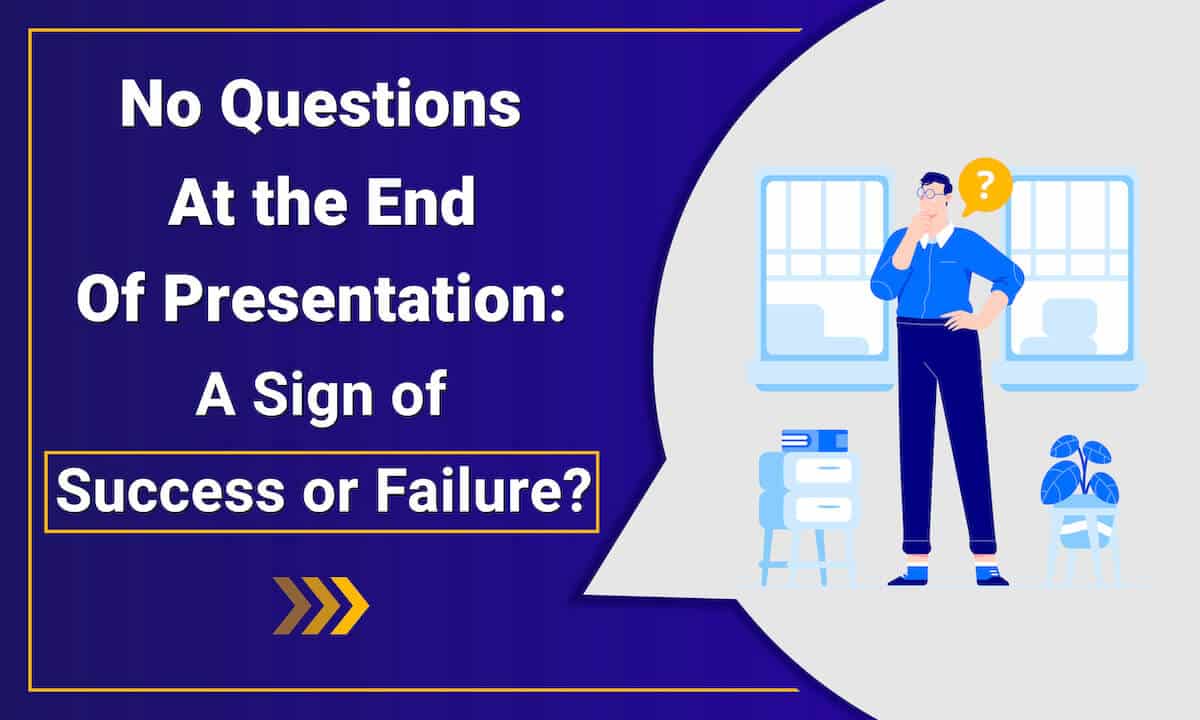Let’s assume a scenario – you are assigned the crucial task of presenting the details of a project that matters the most to your company. You feel fortunate that this opportunity has been given to you, and you prepare your presentation with full zeal. On the big day, you deliver your presentation with utmost confidence and convey every vital piece of information effortlessly. And while you talk, your audience listens to you in awe and is engrossed in every word. The atmosphere of the conference room is exhilarating, which speaks volumes about your power-packed delivery. But as you are about to conclude your presentation and display your final slide with a concise message written on it – “Any question?” a wave of silence spreads in the room. No question at the end of the presentation!
How would you take it? Will you consider it as a sign of success or failure?
Well, most presenters assume the absence of questions as a sign of failure. But, this is not always the case!
In this blog post, we will discuss in detail whether no question is a good sign or a bad one. Let’s delve!
Why are Questions Important?
Questions are integral to presentations for many reasons and benefit both the presenter and the audience.
1. Signify Audience Engagement
Questions from the audience indicate that they were engrossed in your talk, carefully listened to every word, resonated well with what you said, and found your presentation compelling. Their queries signify that they are interested in the subject and want further clarification to enrich and deepen their knowledge.
2. Give the Audience Opportunity to Clarify their Doubts
The knowledge level of all audience members is not the same. So, no matter how well you prepare and deliver your presentation, some audience members won’t be able to get some points clearly. The Q&A session is a golden opportunity for them to clarify all their doubts and enhance their understanding of your content.
3. Final Chance to Wow Your Audience
The Q&A session is the last part of your talk and the final chance for you to delight your audience and win the hearts and minds of some listeners for the first time. By answering their questions rightly and convincingly, you can establish yourself as a subject matter expert and build their trust in your product, service, or solution. So, make the most of this opportunity!
4. Let You Connect the Dot
If anyhow you have missed including any crucial point in your presentation that is of utmost importance to your audience, you can cover it later during the Q&A session. In addition, you can reinforce your core message while answering every single question asked to you, helping the audience quickly grab the key points of your talk and retain them for longer.
5. Help You Understand Your Audience’s Interest
You cover a lot of data and information in your presentation, but the audience members tend to pay more attention to specific points that they are more interested in and ask questions about them. Thus, their questions serve as a roadmap for your next presentation (you can prepare a separate presentation on those topics to help your audience make informed decisions).
6. Make Your Presentation Conversational
Imagine yourself sitting in a conference room and the speaker displaying the slides, one after another, without caring whether you are listening or getting his points or not. In the end, he wraps up simply by displaying a ‘Thank You’ slide. Won’t you feel that you have wasted your valuable time on a worthless presentation?
Well, the entire scene could be interesting if the speaker had added a few questions or prompted the audience to ask questions. Isn’t it?
Questions are good icebreakers. They break the monotony of your presentations, making them conversational. Moreover, by including questions in your presentations or giving your audience a chance to raise their queries, you can keep them hooked and active.
Reasons for Lack of Questions
Several factors, i.e., audience’s hesitance, time constraints, a presentation covering all aspects clearly, etc., that result in no question. Let’s explore these factors in detail –
1. Audience’s Reluctance
Reasons why the audience feels reluctant to ask questions include –
a). Shyness
Some people assume that they will be deemed stupid if they ask questions. Out of their shyness, they hope that the speaker answers the question anyway without needing to be asked or someone else raises the queries about the aspects that they have questions about.
b). Relevance
- Sometimes, the audience members miss a part of the session and don’t ask questions assuming that the question they are about to ask might have already been covered in the part they missed.
- They are not sure whether the question is relevant to the topic or the interest of the other audience members.
- They have a lot of questions in their minds and are unable to decide which one should be asked.
c). Language Barriers
This is the biggest challenge when you present to a multilingual audience. The audience feels that they will not be able to understand the answer because they speak a different language than the speaker does. Moreover, they need time to frame the question. Thus, to avoid the hassle, they prefer not to ask questions.
d). Other Reasons
- They had a negative experience asking questions in previous sessions/events.
- They don’t have the habit of asking questions.
e). Lack of Encouragement
The audience members will not ask questions if you will make them feel as if asking questions is a sign of stupidity/weakness or if their questions are of no value. The lack of an open and positive environment forces the audience to keep their questions confined to their minds.
f). Insufficient Q&A Time
Usually, the presenter allocates the last 20-30 minutes for the Q&A session. In such a short duration, it’s not possible for 250-300 attendees to ask questions individually. In such a scenario, only a few audience members ask questions, and others just listen.
g). Unoptimized Session Formats
Many presentations at big events are one-way, where the presenter is supposed to deliver a tightly choreographed presentation just to get his point across without opening up the floor for questions. The speaker delivers his presentation as if he is telling a story, and the audience feels it pointless to ask questions in between the story.
h). The Content Level
If you have covered every aspect of the topic in detail in your presentation in a comprehensible way, the audience will get your point easily and probably won’t ask questions.
i). Audience Level of Knowledge
If you are talking about a topic your audience is already familiar with, they are less likely to ask questions. Some audience members do their research and come with complete preparation to better resonate with your content. In that case, also, they won’t ask questions.
j). Lack of Interest
If you are talking on a topic that is of no interest to the audience, they will not pay heed to any point and just wait to get your presentation over. Don’t expect them to ask questions if you see them yawning, texting on their mobile, or talking to each other while you deliver your talk.
The Bottom Line
Various factors, such as level and depth of content, audience familiarity with the subject, etc., result in the absence of questions. One of the reasons for no questions is that you might have proactively addressed all potential queries and concerns during your presentation.
Thus, you can’t determine the success or failure of your presentation merely on the basis of this factor. If you genuinely want to evaluate the effectiveness, consider other factors as well, such as audience feedback, reaction, the extent to which your objective is met, and overall comprehension. Informal conversations and surveys will also help you understand the audience’s perception of your presentation.
So, don’t panic if your audience doesn’t raise questions after the presentation is over. Suggest alternative channels to them, such as email, online chat, or follow-up discussions, to provide their valuable feedback or seek further clarification.
Looking For Powerpoint Design Agency?
Call Pursho @ 0731-6725516
Telegram Group One Must Follow :
For Startups: https://t.me/daily_business_reads
#Sign #Success #Failure




